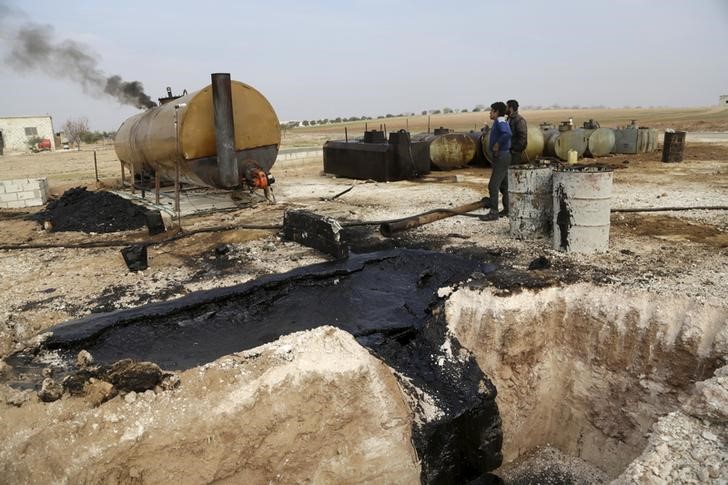By Barani Krishnan
NEW YORK (Reuters) - Oil rose about 2 percent on Friday, with U.S. crude futures headed for their largest weekly gain in seven years, after disruptions to crude supplies from Iraq and Nigeria, and after U.S. economic data lifted Wall Street.
Pipeline outages in Iraq and Nigeria have removed more than 800,000 barrels of crude oil per day from the global market for at least the next two weeks. The disruptions should offset recent increases to supply from Iran, analysts said.
U.S. stock prices hit their highest in nearly two months after an upward revision to the country's economic growth for the fourth quarter. A raft of other U.S. economic data also boosted Wall Street, which has traded in tandem with oil for weeks. (N)
"Equities have been in a rally mode and with the technical picture for oil becoming bullish in the short term, we have a risk-on trade in crude," said Chris Jarvis at Caprock Risk Management, an energy markets consultancy in Frederick, Maryland.
Brent crude was up 90 cents, or 2.6 percent, at $36.19 a barrel by 12:26 p.m. EST (1726 GMT). The session high of $37 was its highest since Jan. 5. For the week, Brent was up nearly 10 percent after rising for four days.
U.S. crude rose 65 cents, or 2 percent, to $33.72 a barrel, after gaining almost $1.70 earlier. For the week, it was nearly 14 percent higher, rising without pause for five days and on track for its steepest weekly rise since January 2009.
Some analysts and traders were pricing oil higher in the near-term.
Hans Van Cleef, senior energy economist in Amsterdam for ABN Amro, said Brent's break above the $36.25 technical resistance indicated "more short covering in the coming days".
Jeffrey Grossman, dealer at New York's BRG Brokerage, said he expected U.S. crude to trade at over $40 by end of March.
Investment bank Jefferies called current oil prices unsustainable, saying output declines among key non-OPEC producers will likely spark price recovery by second half 2016.

Traders were on the lookout for a weekly reading on U.S. oil rigs from industry firm Baker Hughes at 1:00 p.m. EST (1800 GMT) for a gauge on production in the near term. Baker Hughes said last week that the number of rigs actively drilling for oil in the United States have fallen for nine weeks in a row, reaching December 2009 lows. [RIG/U]